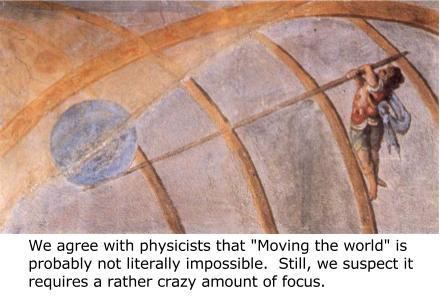A bit about our last few months:
- We’ve been working on getting a simple clear mission and an organization that actually works. We think of our goal as analogous to the transition that the old Singularity Institute underwent under Lukeprog (during which chaos was replaced by a simple, intelligible structure that made it easier to turn effort into forward motion).
- As part of that, we’ll need to find a way to be intelligible.
- This is the first of several blog posts aimed at causing our new form to be visible from outside. (If you're in the Bay Area, you can also come meet us at tonight's open house.) (We'll be talking more about the causes of this mission-change; the extent to which it is in fact a change, etc. in an upcoming post.)
-
We care a lot about AI Safety efforts in particular, and about otherwise increasing the odds that humanity reaches the stars.
-
Also, we[1] believe such efforts are bottlenecked more by our collective epistemology, than by the number of people who verbally endorse or act on "AI Safety", or any other "spreadable viewpoint" disconnected from its derivation.
-
Our aim is therefore to find ways of improving both individual thinking skill, and the modes of thinking and social fabric that allow people to think together. And to do this among the relatively small sets of people tackling existential risk.
Existential wins and AI safety
Who we’re focusing on, why
- AI and machine learning graduate students, researchers, project-managers, etc. who care; who can think; and who are interested in thinking better;
- Students and others affiliated with the “Effective Altruism” movement, who are looking to direct their careers in ways that can do the most good;
- Rationality geeks, who are interested in seriously working to understand how the heck thinking works when it works, and how to make it work even in domains as confusing as AI safety.
Brier-boosting, not Signal-boosting

- Further discussion of CFAR’s focus on AI safety, and the good things folks wanted from “cause neutrality”
- CFAR's mission statement (link post, linking to our website).
I disagree. The LW community already has capable high-status people who many others in the community look up to and listen to suggestions from. It's not clear to me what the benefit is from picking a single leader. I'm not sure what kinds of coordination problems you had in mind, but I'd expect that most such problems that could be solved by a leader issuing a decree could also be solved by high-status figures coordinating with each other on how to encourage others to coordinate. High-status people and organizations in the LW community communicate with each other a fair amount, so they should be able to do that.
And there are significant costs to picking a leader. It creates a single point of failure, making the leader's mistakes more costly, and inhibiting innovation in leadership style. It also creates PR problems; in fact, LW already has faced PR problems regarding being an Eliezer Yudkowsky personality cult.
Also, if we were to pick a leader, Peter Thiel strikes me as an exceptionally terrible choice.
The ten up-votes you have for this post is a signal that either we shouldn't have a leader or if we should it would be difficult for him/her to overcome the opposition in the rationality movement to having a leader.